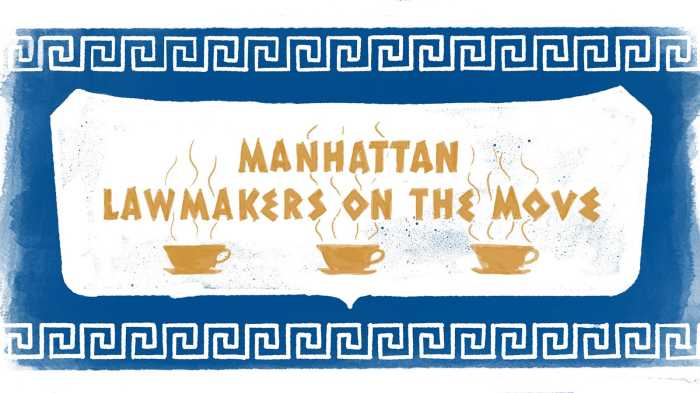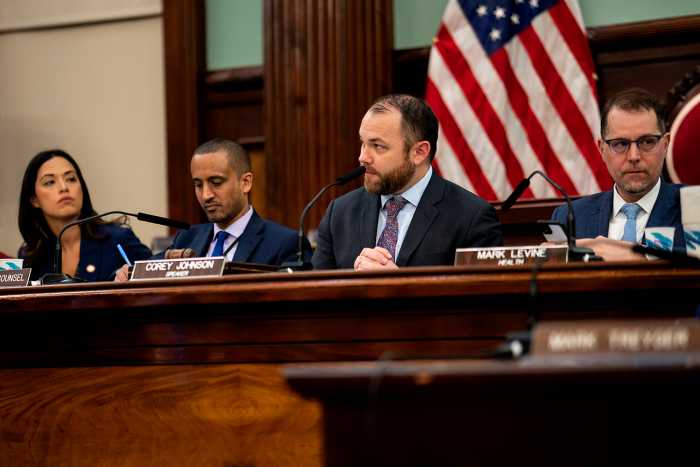Electeds on the Upper East Side are continuing the citywide effort to keep local government connected with its constituents during the worst crisis the City has seen in recent memory.
Last Tuesday, Councilmember Ben Kallos (D-Upper East Side, Midtown, El Barrio and Roosevelt Island) brought together NYC Health Commissioner Oxiris Barbot, a senior analyst at NYC Department of Health and Mental Hygiene, and a plethora of Upper East Side electeds in a virtual town hall via Zoom to talk about the coronavirus.
Among the other electeds in attendance were U.S. Rep. Carolyn Maloney (D-Manhattan, Brooklyn, Queens), Assemblymember Rebecca Seawright (D- Upper East Side, Yorkville, Roosevelt Island), State Senator Liz Krueger (D-Upper East Side, Lenox Hill), Council Member Keith Powers (D-Upper East Side, Carnegie Hill) and Manhattan Borough President Gale Brewer (D).
“This is a once in a century event that has tested all of us as New Yorkers in every aspect of our lives,” said Oxiris Barbot.“Every day we learn something new about how this virus behaves, how it affects people. As we learn more, we adjust our messages and our guidance to New Yorkers.”
Barbot said that their main focus is to ensure that they do everything possible to slow the spread of the virus and maintain the capacity of the healthcare system. She highlighted the importance of social distancing and remaining indoors to help save lives.
“We are asking New Yorkers, that when they go outside, we want them to use face covering,” Barbot said, adding that the new studies show that people in pre-symptomatic phases of the illness can easily spread the virus. “We’ve been very clear that we don’t want New Yorkers to hoard N-95s, we don’t want them to hoard surgical masks. We need to reserve those for our frontline heroes.” She explained that they were asking people to wear cloth masks when going outside.
Dr. Ray Madhury, a senior analyst at NYC Department of Health and Mental Hygiene, also attended the virtual town hall to give information about the COVID-19 and how New Yorkers should act to slow the spread.
“We have wide-spread community transmission, and what that means is you have to assume that every person you see on the street, every person who gets sick, has been exposed to SARS-CoV-2, which is a virus that causes COVID-19,” said Madhury.
She explained that getting tested in New York City would not change anything, considering that there is a risk of being exposed to the virus while going home from the hospital.
“We’re asking people, especially if they are healthy, not to try to go get tested. Don’t go to your doctor and try to get that test because we need to work together and protect our healthcare system from being overwhelmed right now,” said Madhury.
Gale Brewer drew attention to the senior citizen’s access to food during this time, and thanked Fresh Direct that has been helping to drop groceries during this time.
“The seniors are the most vulnerable,” said Brewer. “They can’t leave, they can’t go to the schools where there are many opportunities for food hubs.”
Carolyn Maloneytalked about the three recent coronavirus relief bills passed by Congress during the call. She described the last $2.2 trillion stimulus bill as, “pumping money into people.”
“No city can handle a crisis better than New York after 9/11, Sandy, crash in 2008… But what we are confronting right now is probably the biggest challenge we have ever had,” Maloney said.
However, she assured that New York will receive the necessary funds for hospitals and individuals facing financial challenges and loans for small business reliefs.
Meanwhile, Rebecca Seawright elaborated on the state’s budgetary measures to stimulate our economy. As she explained, the FY 2021 budget forecasts a sizable shortfall in tax revenue due to the crisis.
“The adapted state budget assumes a $10 billion shortfall,” said Seawright. “Later this month, the governor will present an assessment of state revenues along with a plan of action. The legislator would have 10 days to improve on an alternate plan.”
Seawright underlined the importance of critical initiatives like allocating bigger budgets for MTA, education, water quality improvement and land conservation.
“The adapted budget is dependent on additional federal budget funding, desperately needed to jumpstart our state economy,” Seawright added. She also mentioned that her office needs five more volunteers to help with food deliveries for seniors.
At the conclusion of the call, Krueger reassured viewers that she, like her constituents, is looking forward to a return to normalcy.
“We are all waiting for that when someone who knows what they are talking about announces to us, ‘Okay, you can leave your homes again, you can continue your lives’,” said Krueger. “I fear that we will have more people to hug and offer support to after this is over.”


![New York's Upper East Side [Credit: Alex Maisuradze of Wikimedia Commons]](https://politicsny.com/wp-content/uploads/2021/02/Upper_East_Side_NYC-1.jpg?quality=51&w=1200)





